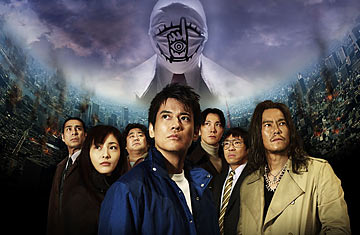
20TH Century Boys
(2 of 2)
The Forbidden Door (Joko Anwar, Indonesia)
From the world's most populous Muslim country comes a mordant, confounding thriller about an unsuccessful artist who becomes an art-world sensation after his wife convinces him to build a sculpture around her aborted fetus. Suddenly he's besieged with commissions — but where to find more dead babies? As slick as it is sick, the movie could be Anwar's calling card for international employment, if only Hollywood moguls wanted something out of their own narrow range. The Forbidden Door is one more NYAFF example of what movies could be but rarely dare to try.
Lalapipo (Masayuki Miyano, Japan) and Blind Love (Daisuke Goto, Japan)
For nearly a half-century, Japan's most prolific genre has been Pink Eiga — soft-core, low-budget sex films. It's served as a training ground for young directors; the NYAFF showed an early effort by Yojiro Takita, who won the foreign-language Oscar this year for Departures. Goto, the current hot Pink auteur, was represented by the sweeter-than-it-is-sexy Blind Love, a twist on Cyrano de Bergerac, with a ventriloquist using a friend to woo (and have sex with) his inamorata. Lalapipo (Lot of People), set in the teeming, tumescent world of the porn industry, is an agreeably demented farrago whose hero has a talking penis that looks like a Muppet — say, the Nookie Monster — and urges him to have sex with someone other than himself. If you get to see the movie, stick around for the UFOs.
Love Exposure (Sion Sono, Japan)
Loving man, beautiful woman, dutiful son: this happy family of Catholics is so devout that the mother gives her boy, Yu, a statue of the Virgin Mary and tells him, "Find someone just like her to marry." When the mother dies young, her husband becomes a priest with a gift for applying God's word to his parishioners' lives. The father-son bond is tested when the priest is stalked and seduced by an unstable woman who soon deserts him, leaving this gracious man severe and doctrinaire. How can Yu reconnect with his father? By committing outrageous sins and confessing them to him. This is the first 15 minutes of a four-hour whirlwind epic of faith, family, cults, cross-dressing, upskirt photography and violent femmes, told with confidence and intensity, and based not on a manga but on the life of a friend of director Sono (The Suicide Club). Unmissable — except it has no U.S. distributor. The DVD will be released later this month by YesAsia.
Written By (Wai Ka-fai, Hong Kong)
Wai has written many movies for Hong Kong's last standing top director, Johnnie To, including Vengeance, the Johnny Hallyday gangland saga that played at Cannes this year. On his own, Wai offers Written By, a conceptually complex yarn beginning with a car crash that kills a man and blinds his young daughter. Years later, the daughter (Kelly Lin) writes a novel in which she dies and the father (Lau Ching-wan) survives but is blinded. Then, within that fantasy, the father writes a novel reviving his child. It's a little more appealing as a Charlie Kaufman-like structure than as a movie; but Lau, for two decades the prime mopey presence in Hong Kong films, brings gravity and grace to the conceit.
When the Full Moon Rises (Mamat Khalid, Malaysia)
Noir meets nutso in this black-and-white thriller from a vital national cinema whose films are virtually unknown in the U.S. After his car runs over something on a country road — turns out to be a skeleton — a tough-guy newspaperman stops in a small town that seems to be under the curse of a female ghost and is certainly teeming with oddballs. It's the old story of the city slicker out-crazied by the remote rubes. Unfamiliarity with Malaysian film conventions may leave you wondering whether the tone is comic or melodramatic or simply extraterrestrial. No matter: enjoy the gorgeous neo-primitive imagery and the inexplicable shenanigans. We'll bet that even Malaysians were pleasantly baffled.
Quick Gun Murugun (Shashanka Ghosh, India)
Quick Gun, the hero of this goofy, riotously colorful comedy, is a cowboy who's also an Indian (from the southern Indian state of Tamil Nadu): a pudgy chap with pomaded hair and a gigolo's thin mustache, outfitted in white hat and boots, green shirt, orange pants, pink scarf, leopard-skin vest. He's determined to stop his nemesis from turning the Tamil dish of vegetarian crepes into all-meat patties in a chain of McDosa fast-food restaurants, and to achieve his mission he'll need to be reincarnated, as himself. Originally a series of spots for MTV India, the feature version is lovingly, lavishly, almost libelously indebted to Sergio Leone spaghetti Westerns. It also makes passing reference to The Terminator, Pulp Fiction and Crouching Tiger, Hidden Dragon — and, since every Indian film needs a production number, it filches a song from the 1968 Tamil musical Oli Vilakku. By the end, when Quick Gun comes out blazing with eight gun-totin' arms, the movie has fulfilled the agenda of the NYAFF: to render its audience happy and helpless with head-swiveling astonishment.
